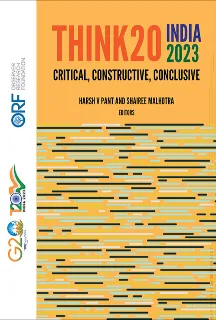Editors’ Note
The world is grappling with a myriad of simultaneous challenges including the enduring consequences of the COVID-19 pandemic, the Russia-Ukraine conflict, rising inequalities, and the existential threat of climate change. Great-power competition has led to a crisis of multilateralism itself, resulting in the stagnation of the global governance agenda. These render the G20, as the world’s most influential and representative platform, more paramount than ever in its 24-year history. Created in response specifically to the Asian financial crisis, the G20, with its unique membership embracing the developed and developing worlds, has proven itself capable of rising to the occasion when needed. This year its presidency is in the hands of India—a country keen to offer solutions by championing novel ideas, innovative solutions, and inventive approaches to the world’s seemingly intractable challenges.
That ideas have the power to change the world is a truism. Indeed, ideas are key in shaping policy. Equally important, however, is for those ideas to be informed by sound research and analyses. The Think 20 or T20 engagement group, therefore—as the ‘Ideas bank’ of the G20—plays a crucial role in the G20 ecosystem. Through deliberations and discussions, as well as the publication of Policy Briefs, the T20 brings together scholars, academics, policymakers and think tanks from countries of the Global North and Global South to ideate plausible solutions to the current challenges facing the global community.
Under India’s G20 presidency, the T20 process commenced in January 2023 and culminates in the T20 Summit in August. This compendium, Think20 India 2023: Critical, Constructive, Conclusive, attempts to capture this engagement which is at once wholesome and provocative. Bringing diverse perspectives from G20 countries, these 15 essays explore the core themes of India’s presidency, highlighting the challenges and framing pathways to sustainable solutions.
The essays seek to shore up more meaningful conversations around the various task forces and their work streams, addressing the critical questions of not only ‘what’ and ‘why’ but also the ‘how’. If there is a theme that threads these essays, it is that all of our current challenges—whether worsening climate change or the ramifications of digital transformation, uneven economy recovery, or weakened multilateralism—require global cooperation. Adding depth to ongoing debates across the globe, each chapter in this forward-looking compendium encapsulates this spirit of exchange and collaboration. It has been our privilege and pleasure to curate these contributions and savour their engaging perspectives.
The subject of this volume’s first section is ‘Macroeconomics, trade and livelihoods’. Mia Mikic opens the volume with an essay that analyses the crucial issue of supply chain resilience in a global economy that is highly interdependent. Deborah Elms then outlines the experiences of Asian countries and underlines the benefits of economic integration over protectionism. Hyung-gon Jeong lays out policy measures to ensure the security of supply chains and mitigate risks for critical sectors such as semiconductors, pharmaceuticals, core minerals, and raw materials.
The second section tackles the subject of the world’s digital future. In her piece, Mathilde Forslund recommends concrete implementable steps to the G20 and partner countries to expand healthcare access through digital transformations and increase progress towards universal health coverage. Alison Gillwald, for her part, makes a case for harnessing data for development and using digital public goods for economic transformation.
The sixth and seventh essays confront the subject of ‘Clean energy and green transitions’. Paula Ellinger and Nathália Rezende emphasise the need for a holistic approach towards just transition that mainstreams gender, recognising how women are both a vulnerable group and key agents of change in their communities. Shuva Raha cautions against one-size-fits-all prescriptions to measure lifestyle and consumption patterns; she argues for the adoption of country-specific approaches that consider the unique circumstances and drivers of each.
The global financial architecture—in need of upgrades and reforms—is the subject of the next set of essays. Annalisa Prizzon describes the challenges confronting multilateral development banks in fulfilling their role to finance solutions to global issues, and proposes a model to overcome these obstacles. While the next essay, authored by Diana Cardenas Monar, Chloé Boutron, Sarah Bendahou and Louise Kessler, is grouped in this section, it in fact straddles three themes—they write about the need to synergise SDGs finance and climate finance and offer a framework for overcoming gaps in funding through an integrated approach.
Continuing on the subject of SDGs, the authors of the next set of essays emphasise the need for policies to be designed in ways that ensure that “no one is left behind”. Martin Koehring highlights the potential of marine natural capital and the blue economy to accelerate the journey to the 2030 Agenda. In their contribution, Victoria Y. Fan, Janeen Madan Keller, and Abha Mehndiratta outline ways to advance global health cooperation by offering a synthesis of India’s role in global health. Meanwhile, Pramit Verma recommends innovative approaches to achieving the SDGs.
Rounding off the volume are three essays that ponder the question of ‘reformed multilateralism’. Indeed, while global challenges continue to multiply, multilateral institutions such as the United Nations and the World Trade Organization (WTO) are struggling to keep pace. Amidst structural shifts and a dire need to transform our global institutions and frameworks, M. Sait Akman outlines concrete actions to revive the functions of the WTO in a rapidly changing global economy. Melissa Conley Tyler and Tom Barber then offer a fresh perspective to minilaterals and their ability to complement multilateral structures and contribute to stability at multiple levels. The last essay, again on the WTO and written by Christian Bluth, considers Joint Statement Initiatives as a promising route to revitalise the system.
As India passes over the G20 baton to Brazil, a peer in the Global South, we hope that the insights enunciated in these essays will inspire and enrich the debates ahead.
The views expressed above belong to the author(s). ORF research and analyses now available on Telegram! Click here to access our curated content — blogs, longforms and interviews.

 PDF Download
PDF Download



 PREV
PREV



